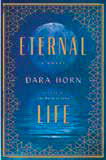
by admin
How to Appreciate Being Mortal
 My grandmother, who was born in Jaffa, then part of Syria, in 1906, lived to be 103 years old. She outlived her younger and older siblings, her husband, and nearly all of her friends. She had a full life, but by the end she’d had enough life, thank you very much.
My grandmother, who was born in Jaffa, then part of Syria, in 1906, lived to be 103 years old. She outlived her younger and older siblings, her husband, and nearly all of her friends. She had a full life, but by the end she’d had enough life, thank you very much.
I couldn’t help but think of my grandmother as I read the fifth novel by Dara Horn, Eternal Life (W.W. Norton & Company, $16.20), a novel of ideas that is also a fantastical tale of time travel, romance, and immortality. Horn’s 2000-year-old protagonist, Rachel, is ready to die, but she can’t because she made a bargain with God during the Second Temple. In order to save her first son, she and the child’s father, Elazar, agree to eternal life. This may not sound like a bad bargain to many. Google “eternal life,” and all kinds of life-prolonging vitamins and supplements appear on your screen. Initially, Rachel doesn’t consider the bargain unfair, but by the time we meet her, she’s exhausted from living so long and, more importantly, from watching almost everyone she has loved die. The novel moves between Rachel’s current life as a businesswoman and widow and her pasts, from suburban America to Roman-occupied Jerusalem.
In an interesting take on immortality, Rachel doesn’t live a single life for 2000 years; she has what looks like many lives, but her consciousness remains the same. She calls each life a version, “a nusach, the liturgical term, like a melodic variation on a theme.” In each version, however, Rachel is a woman and a mother, allowing Horn to focus on her central concern: motherhood. At one point, Rachel thinks back on her time caring for her children: “she tried to estimate how many thousands of times she had nursed an infant, how many meals she had cooked for others, how many spoons of medicine she had raised to other people’s lips…the sacrifice was bottomless, heavy labor cast into a void.” While Rachel has had hundreds of children over the years, mortal mothers will relate to her sense of endless servitude, the many repeated tasks and duties of motherhood. Horn, a mother of four young children, tells Publishers Weekly that the concept for the novel was born out of “ten and a half continuous years of changing diapers.” The oft-heard lament, “It goes by so fast!” didn’t apply to her, though it seems only to apply in retrospect for any mother: in the midst of all that caring and worry and responsibility, time can feel as slow as the ages. Horn is at her best—witty and tender—as she illuminates the challenges of mortal motherhood. Attempting to understand her current son’s business interest, for instance, Rachel thinks, “as it had been true for centuries, she had no idea what her child was talking about.”
Another and related concern of the novel is the generational resistance to the knowledge of our elders. When Rachel tries to explain her situation to her children or grandchildren, or in one instance a psychiatrist, she is dismissed as crazy. The psychiatrist prescribes lithium, and her 21st century granddaughter Hannah, posts: “My grandmother just told us she can’t sign off on her will because she CAN’T DIE. #crazyoldlady.” But Rachel isn’t crazy; remarkably, she is pretty well-adjusted given all she’s been through. Still, nobody can hear or appreciate her wisdom.
And Rachel is also wrong about some key events, especially as it pertains to her sons’ actions. With both Rocky, her current troubling son, and her very first son, Yochanan, she is a harsh critic, though others see them as geniuses. Yochanan, after all, saves the Torah during the Roman siege of Jerusalem, thereby preserving Judaism. Rachel doesn’t exactly admit that she’s wrong about these things, but she does have this to say about the limitations of knowledge and specifically a parent’s knowledge: “Forgive us God, for we are alive, and despite what we tell our children about how to be alive, we still have no idea what we are doing, and likely never will.”
Rachel finds some succor in her ongoing relationship with the father of her first child, Elazar. He, too, cannot die, but neither can they be together, except fleetingly. In the many leaps of faith that this novel requires, strangely it is the sustained passion between Elazar and Rachel that may be the hardest to sustain. After 2000 years, Rachel still swoons when she sees Elazar, and their lovemaking is as lusty as ever despite his betrayals and the many disappointments of a long life. It seems that Rachel, who, we learn from her granddaughter’s genetic testing, has the genetic makeup of a teenager, also has the libido and naïveté of one—at least where Elazar is concerned. Surely, time would dull these passions?
Rachel’s motivations or perceptions are sometimes unclear or unconvincing, perhaps because of her many incarnations through the centuries—scribe’s daughter, shopkeeper, housewife. Eternal Life succeeds intellectually though it doesn’t hit in the heart. Read it for what it has to say about motherhood, for its vivid depiction of ancient Jewish history, its wry humor, and to contemplate the way the past lives on in us all.
RACHEL HALL is the author of Heirlooms, fiction selected by Marge Piercy for the G. S. Charat Prize.